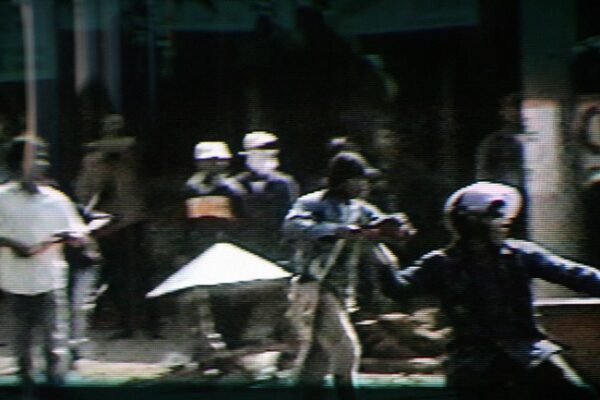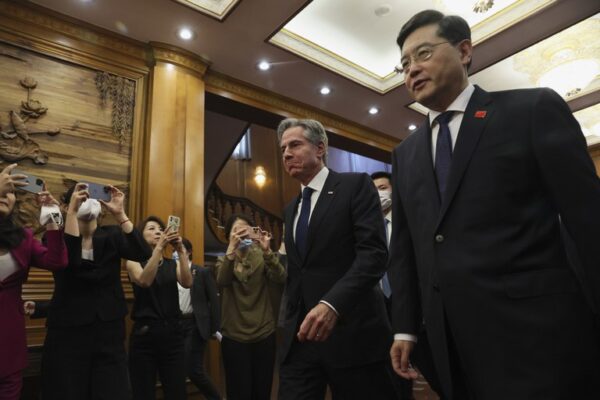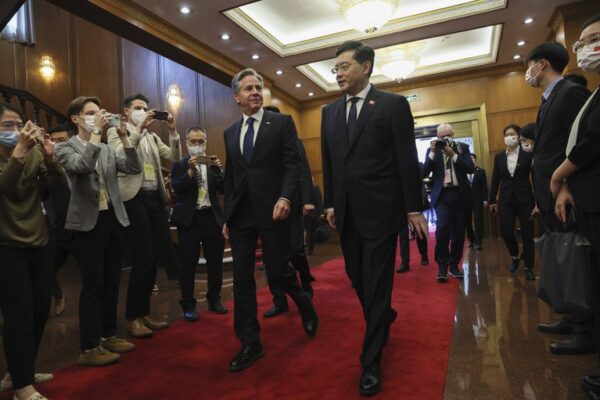On June 11, a group of Montagnards in Vietnam’s Central Highlands attacked the offices of two communes with small arms and molotov cocktails, killing four policemen, two commune officials, and three civilians. The attackers wounded two other policemen and burnt the commune offices. This prompted an immediate and massive government response. As of the time of writing, 74 people have been arrested, including, allegedly, one of the group’s masterminds. Two people turned themselves in, and the government has promised leniency for others who surrender. Montagnard villagers throw stones during a protest in Vietnam’s central highland province of Dak Lak in this screenshot from video taken on April 10, 2004. Credit: Dak Lak Provincial People Committee handout via Reuters So far, almost all of the information about the events has come from the government side, so there is clearly a bias in the reporting. The government has selectively leaked a lot of information and ensured that the story has gotten coverage in the state-controlled media. The Communist Party of Vietnam immediately dispatched deputy prime minister Tran Luu Quang and the deputy minister of public security Luong Tam Quang to signal government control, a sign of the government’s insecurity. Legitimate grievances Dak Lak and the Central Highlands are not new to unrest, though gun violence is very rare in Vietnam. But the region has not been beset by violence for a while, which begs some questions: Why now? What prompted this latest spate of unrest? There are a number of underlying issues for any unrest involving the Montagnards, a broad grouping for some 30 different tribes, in the Central Highlands. Beginning in the 1990s, the Vietnamese government began to encourage migration of ethnic Kinh Vietnamese to the region to establish coffee plantations and other agribusinesses. U.S. Special Forces personnel show Montagnard fighters the finer points of rifle handling and safety during a training session in July 1962. Credit: Horst Faas/Associated Press Today, Vietnam is the second largest coffee producer in the world, exporting over 1 million metric tons in 2022, and almost all of it comes from the Central Highlands. But that put the Kinh population at odds with the Montagnards, who practiced swidden agriculture: burning forests, farming for a few years, and then moving on to new land. All of a sudden, with land titles going to the Vietnamese settlers, the Montagnards were unable to practice their traditional agriculture, its environmental degradation and inefficiency. Beyond the economic interests in encouraging Kinh settlement, the government had a political interest in settling the region. The Montagnards had close ties to both the French colonial government as well as the Americans. Persecuted minorities often seek protection from the majority population. During the Vietnam War, the United States relied on the Montagnards and the Hmong in neighboring Laos to interdict North Vietnamese troops and supplies along the Ho Chi Minh Trail. Hanoi has never forgiven them for this. But while the Montagnards often portray their struggle as being anti-communist, it’s important to note that the government of the pre-1975 Republic of Vietnam treated them terribly, too, believing that they were abetting North Vietnamese on the Ho Chi Minh Trail. South Vietnamese government officials shared the same mistrust and condescension as their rivals in Hanoi. Beyond politics, there is simply a lot of condescension by Kinh towards the poor tribes that constitute the Montagnards. For the Montagnards, this is simply a form of internal colonialism; indeed, some Montagnards do not even respect Vietnamese sovereignty. Montagnard hill tribesmen emerge from dense forest northeast of Ban Lung, in Cambodia’s northeastern province of Ratanakiri July 22, 2004. Credit: Adrees Latif/Reuters That animus and mistrust is further compounded in Hanoi by the fact that many of the Montagnards are Evangelical Christians. The Vietnam Fatherland Front, an arm of the Communist Party responsible for mass organizations and religions, only recognizes six religions, controlling their clergy and organization. Evangelical Christianity continues to go unrecognized, and, as such, the house churches are technically illegal. That many of the Montagnard congregations are supported by faith groups in the United States and elsewhere compounds Hanoi’s paranoia. Land and religious freedom remain at the heart of Montagnard grievances, but there are others. The Central Highlands remains a poor region of the country, lagging in human development indicators, educational opportunity, and public health. While Vietnam enjoyed over 8 percent economic growth in 2022 and was the darling of foreign investors, receiving over $22.4 billion in investment, that prosperity is nowhere to be seen in the Central Highlands. And while we should not be conspiratorial about this, we do need to consider that the unrest comes at a time when U.S.-Vietnamese relations are set to be upgraded to a “strategic partnership.” CPV General Secretary Nguyen Phu Trong has agreed in principle to visit Washington this summer, and President Biden is expected to travel to Vietnam in the fall. Not everyone in Vietnam’s conservative and xenophobic national security establishment and party echelons are happy with the deepened ties. A full-on crackdown is likely to prompt the U.S. Congress to scrutinize Vietnam’s already dismal human rights record, assault on independent journalists and environmental activists, and control over social media. The quick and effective government response has not been bad for the Vietnam Ministry of Public Security or its minister, To Lam, who immediately promoted the four officers posthumously and moved quickly to compensate their kin and the wounded officers. What do we know about the attacks? So far we know very little about the motivation for the attacks or the group’s organization or foreign ties, if any. Montagnard organizations in the United States have denied any involvement. Montagnards who fled Vietnam’s Central Highlands wait in Cambodia’s Senmonorom in Mondulkiri province, which borders Vietnam, May 15, 2001. Credit: Reuters A spokesman for the ministry of public security said the group had acted in “an organized manner, reckless, ruthless and without humanity.” Suspects, allegedly, had been “ordered to kill officers and local police on sight, taking their assets and weapons.” According…






